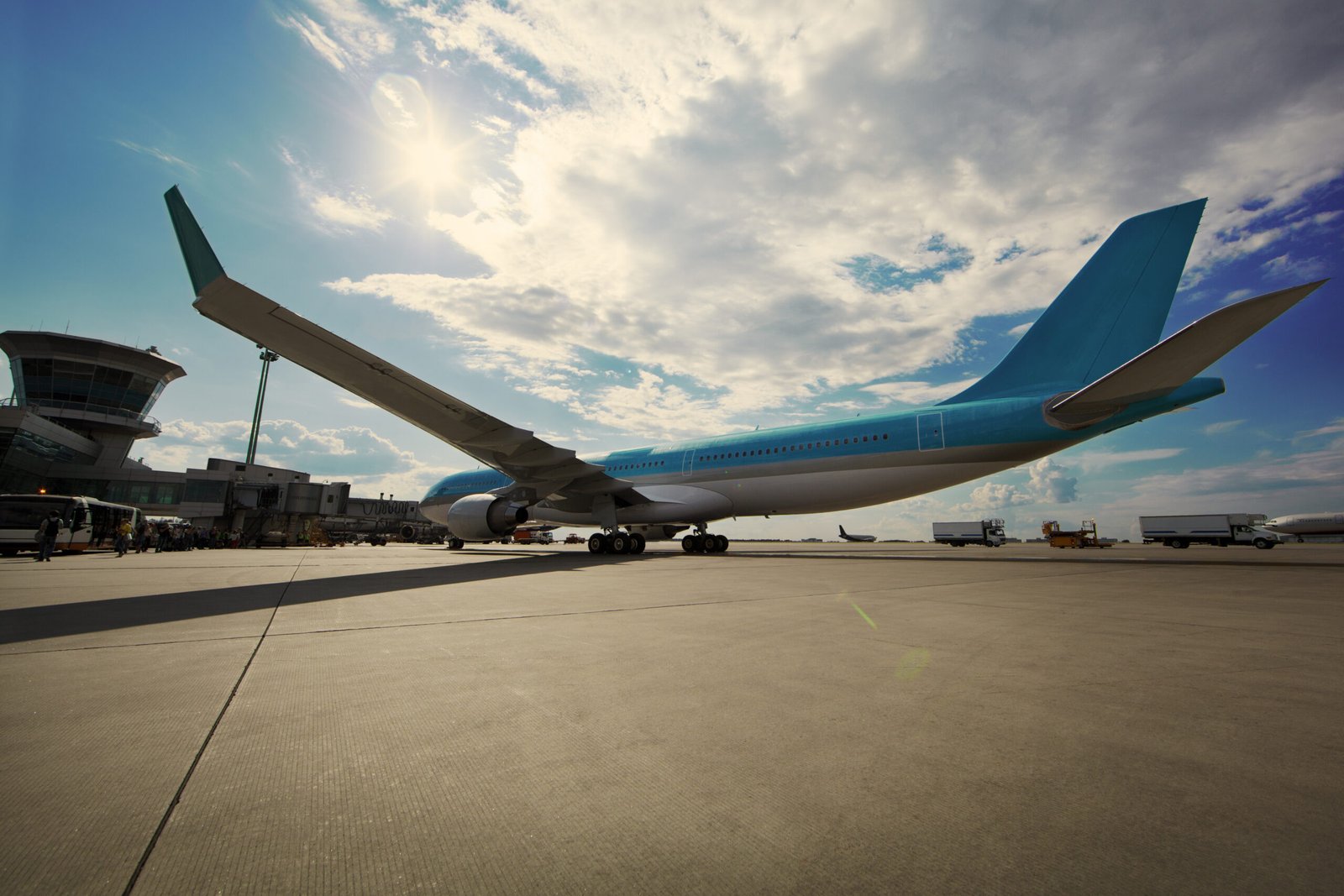Aviation Schools
Flight Patterns: The Fascinating Evolution of Air Travel Through the Decades
Aviation, an industry that has revolutionized the way we traverse our planet, has undergone a remarkable transformation over the decades. From its humble beginnings in the early 20th century to today’s advanced technologies and training programs, air travel continues to evolve. One aspect that stands out in this evolution is the education and training of aspiring aviators. With various aviation schools offering specialized courses, enthusiasts can now navigate their way into a sky-high career.

When it comes to aviation education, there are several types of courses available tailored to different interests and career paths. For those aiming to become pilots, flight training schools provide comprehensive programs ranging from Private Pilot Licenses (PPL) to Airline Transport Pilot Licenses (ATPL). These courses cover everything from basic aerodynamics and meteorology to complex navigation techniques. Additionally, aspiring mechanics can enroll in Aircraft Maintenance Engineering programs that delve into aircraft systems, repairs, and regulatory compliance.
For individuals interested in air traffic control or aviation management, specialized courses are offered at various institutions. Air Traffic Control programs focus on communication protocols and safety regulations essential for maintaining order in busy airspaces. Similarly, Aviation Management degrees encompass business principles applied specifically within the aviation sector—preparing students for roles in airport operations or airline management.
Beyond formal education, numerous resources exist online for those seeking knowledge about aviation trends and news. Blogs like “The Points Guy” offer tips on maximizing travel rewards while providing insights into airlines’ latest offerings. Websites such as FlightAware allow users to track real-time flights globally—a fascinating tool for both enthusiasts and professionals alike.

Social media platforms have also become invaluable for aviation aficionados. Instagram accounts like @aviationdaily showcase stunning imagery from around the world—capturing breathtaking views of airplanes in flight or ground handling operations. Twitter hashtags such as #AvGeek unite individuals who share a passion for all things airborne; it’s a community where one can exchange experiences or learn about upcoming events.
In addition to traditional flight schools, FAA-approved flight training centers have gained prominence across the nation. These certified facilities adhere strictly to Federal Aviation Administration regulations while providing top-notch training using state-of-the-art simulators alongside actual flight experiences. Simulators play an integral role in modern pilot education by allowing students to practice emergency scenarios without jeopardizing safety. This innovative approach enhances skill development while building confidence before stepping into an actual cockpit.
Moreover, many FAA-approved flight schools offer programs designed for every level—from beginners taking their first lessons to seasoned pilots looking to upgrade their certifications or ratings. Each program is crafted with rigorous standards ensuring graduates are well-prepared for their careers ahead.
As we look back through decades of progress within air travel—from wooden biplanes soaring above fields to sleek jets cruising at high altitudes—it’s evident that ongoing education remains crucial for anyone wishing to soar in this dynamic field. Whether you’re passionate about piloting planes or fascinated by managing airport operations, today’s diverse array of aviation courses equips learners with necessary skills while connecting them with vibrant communities eager to share insights along their journey through the skies.
Embrace your inner aviator; explore these educational avenues and resources as you chart your own course through the thrilling world of aviation!
From Biplanes to Drones: The Evolution of Flight Through the Ages
Aviation has always been a field that captivates the imagination, marking significant milestones in human innovation. From the rudimentary biplanes of the early 20th century to today’s sophisticated drones, the evolution of flight is a remarkable journey filled with technological advancements and educational opportunities. As we continue to explore this fascinating domain, aviation schools have become essential in shaping aspiring aviators and enthusiasts.
When it comes to aviation education, various types of courses cater to different interests and career goals. For those looking to become pilots, traditional flight training programs offer comprehensive curricula that cover everything from basic flying skills to advanced navigation techniques. Many schools also provide specialized courses for commercial pilots, instrument-rated pilots, and even airline transport pilot (ATP) certification.

In addition to pilot training, there are programs focused on aircraft maintenance and repair—these often include hands-on experiences in workshops or hangars where students can work on real aircraft. Similarly, air traffic control programs equip students with vital skills needed for managing air traffic safely and efficiently. With the rise of unmanned aerial vehicles (UAVs), many aviation schools now offer drone piloting courses as well as UAV operations management classes.
To stay connected and informed about aviation trends, numerous blogs and websites serve as valuable resources for both professionals and hobbyists alike. Notable blogs like “The Aviation Herald” provide insights into aviation safety issues through detailed accident reports while “AirlineReporter.com” offers captivating stories about airline travel experiences combined with industry news. Websites such as “Flying Magazine” host extensive articles covering various topics from aircraft reviews to pilot tips.
Social media platforms further enhance community engagement within the world of aviation. On Instagram, accounts like @aviationdaily showcase breathtaking aerial photography alongside informative infographics about aircraft specifications or flying tips. Meanwhile, Twitter boasts active discussions among aviators under hashtags such as #AvGeek or #PilotLife which allow users to share their experiences instantaneously.
For those seeking formal training in America, FAA-approved flight schools are a crucial part of the equation. The Federal Aviation Administration provides a list of accredited institutions that meet stringent standards for quality instruction in both ground school and flight training environments. These schools often feature state-of-the-art simulators that replicate real-life flying conditions without leaving the ground—a perfect tool for honing one’s skills before taking off into the skies.

Flight simulators have revolutionized how pilots train today; they enable immersive practice scenarios ranging from routine flights to emergency situations without risking lives or equipment. Many reputable FAA-certified facilities utilize advanced technology that accurately mimics cockpit layouts along with realistic weather patterns—creating an unparalleled learning environment for prospective aviators.
As we witness continued advancements in aviation technology—from electric planes being designed by visionary companies to autonomous drones performing complex tasks—the educational landscape must adapt accordingly. Whether you’re passionate about becoming a pilot or simply curious about UAV technology, diverse courses are available at various institutions across the country.
In conclusion, exploring the evolution of flight reveals not only technological progress but also highlights how education plays an integral role in shaping future generations within this dynamic field. With countless resources available through blogs, social media sites, FAA-approved flight schools, and specialized training programs dedicated solely to enhancing knowledge around aviation—there has never been a better time to embark on your own aerial journey!
Cloud Computing in Aviation: How Technology is Transforming Air Travel
In an industry that thrives on innovation, cloud computing has emerged as a game-changer for aviation. This technology not only enhances operational efficiency but also redefines how airlines interact with passengers and manage resources. As we soar into the future of air travel, it’s crucial to explore the intertwined realms of education, communication, and training within aviation.
*Aviation Schools by Types of Courses**
For aspiring pilots and aviation professionals, choosing the right educational path is paramount. Aviation schools offer a variety of courses tailored to different aspects of the industry. These can be broadly categorized into:
1. **Pilot Training Programs**: These courses prepare students for their FAA certifications, including Private Pilot License (PPL), Commercial Pilot License (CPL), and Airline Transport Pilot License (ATPL). They cover essential topics such as flight theory, navigation, meteorology, and hands-on flight training.
2. **Aviation Management Courses**: Focusing on the business side of aviation, these programs delve into airport operations, airline management, and logistics. Students learn about regulatory compliance and strategic planning vital for running successful aviation businesses.
3. **Aerospace Engineering**: For those intrigued by aircraft design and maintenance, aerospace engineering programs provide in-depth knowledge about aerodynamics, materials science, and structural analysis.
4. **Air Traffic Control Training**: Specialized courses prepare individuals to manage aircraft flow in busy airspace environments efficiently while ensuring safety.
Each course type offers unique insights into various fields within aviation – paving the way for a well-rounded skill set in this dynamic sector.
*Lists of Aviation Blogs, Websites, Social Media Sites**
Staying updated with trends and developments in aviation requires reliable sources of information. Several blogs and websites are dedicated entirely to this field:
**Airline Reporter**: An excellent resource for news related to airlines’ operations along with reviews.
**The Points Guy**: Focuses on maximizing travel rewards through credit cards while providing insights on airlines’ loyalty programs.
**FlightGlobal**: Offers a comprehensive overview of aviation news covering everything from commercial flights to military developments.
**Simple Flying**: A blog that captures daily happenings in commercial aviation with engaging articles.
Social media platforms are also rich with content from influencers and experts alike:
On Twitter, you can follow accounts like @flightradar24 or @airlinesdotnet for real-time updates.
Instagram features stunning aerial photography from enthusiasts using hashtags like #aviationlovers or #pilotlife.
Engaging with these platforms enriches your understanding while connecting you to a vibrant community passionate about flying.
*FAA Flight Schools/Airplane Schools/Simulators**
When it comes to obtaining necessary flight training credentials under FAA guidelines, numerous reputable flight schools exist across the country. Institutions like Embry-Riddle Aeronautical University or ATP Flight School stand out due to their robust curricula focusing on both practical flying skills and theoretical knowledge.
Additionally, many schools now offer advanced simulators that replicate real-world flying scenarios without leaving the ground. These state-of-the-art devices allow students to practice maneuvers safely before stepping into an actual cockpit—a significant boon considering safety protocols in today’s fast-paced environment.

With cloud computing facilitating data sharing among these institutions—such as enhancing simulator technology—the future looks promising for aspiring aviators. Not only does technology streamline operations; it fosters an interconnected global community eager to learn from each other’s experiences.
In conclusion, cloud computing’s influence permeates every layer of air travel—from education through online resources down to practical training methods—all working together toward creating safer skies for everyone involved. Embrace this transformation; it’s just taking off!
From Propellers to Jets: A Journey Through Aviation History
The history of aviation is a remarkable tapestry woven from innovation, determination, and the innate human desire to conquer the skies. From the first wood-and-canvas biplanes that sputtered across fields to the sleek, high-speed jets soaring at 30,000 feet, aviation has evolved dramatically over the decades. This evolution continues today with an array of educational pathways for aspiring aviators and enthusiasts alike.
When it comes to pursuing a career in aviation, several types of courses are available at various aviation schools. For those captivated by the mechanics of flight, there are programs specializing in aircraft maintenance and engineering. These courses delve into aerodynamics, propulsion systems, and avionics—essential knowledge for keeping aircraft safe and operational.
For future pilots, flight training is paramount. Many schools offer private pilot licenses (PPL), instrument ratings (IR), commercial pilot licenses (CPL), and even airline transport pilot (ATP) certifications. Each course builds on practical skills and theoretical knowledge needed for safe navigation through diverse flying conditions. Additionally, specialized instruction in areas like helicopter piloting or glider operation provides niche opportunities for those looking to diversify their skill set.
Moreover, universities often integrate aviation management programs that combine business principles with aviation regulations, preparing students for leadership roles within airlines or airport operations. With such a wide range of options available, prospective students can tailor their education according to their passions within this dynamic field.
As one embarks on this journey through aviation education, staying informed about industry trends and insights is crucial. Fortunately, numerous blogs and websites cater to both professionals and enthusiasts alike. Some notable aviation blogs include “AirlineReporter,” which covers news on airlines’ latest innovations; “Flying Magazine,” which offers advice on flying techniques; and “AeroSavvy,” focusing on pilot training resources.
Social media platforms also serve as fantastic conduits for connecting with fellow aviators. On Instagram or Twitter, accounts like @pilotlife showcase breathtaking aerial snapshots while providing relatable content about daily life as a pilot. Meanwhile, Facebook groups dedicated to specific aircraft models or flying experiences create vibrant online communities where members share tips and stories.
For those seeking formal education or practical experience in flight operations specifically within the United States framework, FAA-approved flight schools are indispensable resources. The FAA maintains rigorous standards ensuring that accredited institutions provide comprehensive training covering all aspects of piloting—from theoretical coursework to hands-on flight experience using state-of-the-art simulators.
These simulation technologies have revolutionized pilot training by offering realistic environments where students can practice maneuvering without risks associated with real-life scenarios. They allow learners to familiarize themselves with cockpit instruments while engaging in emergency procedures under controlled settings—a critical component in building confidence before taking control of actual aircraft.

In summary, from propeller-powered pioneers like the Wright brothers to today’s advanced jets capable of crossing continents swiftly—aviation history is filled with milestones that inspire countless individuals worldwide. By exploring varied educational paths through specialized courses at aviation schools while leveraging contemporary resources like blogs and social media platforms—future aviators are well-equipped not only to understand but also contribute actively to this ever-evolving industry that has captured our imaginations since time immemorial.

Navigating the Skies: A Beginner’s Guide to Understanding Aviation
Embarking on a journey into the world of aviation can be exhilarating yet overwhelming. With so many paths one can take, it’s crucial to understand the various options available. From specialized schools to an abundance of online resources, this guide aims to illuminate your route through the skies.
### Types of Aviation Schools and Courses
When considering a career in aviation, the first step is selecting the right type of school. Here are some key categories:
1. **Flight Schools**: These institutions focus primarily on training pilots. They offer programs ranging from private pilot certificates to commercial licenses and even advanced ratings for instrument flying.
2. **Airline Transport Pilot (ATP) Schools**: For those aspiring to fly for commercial airlines, ATP schools provide intensive training specifically tailored for airline operations, including multi-engine flying and crew resource management.

3. **Aviation Maintenance Schools**: If you’re more interested in keeping aircraft in top shape rather than piloting them, consider enrolling in an aviation maintenance program. Here, students learn about airframe and powerplant systems, gaining skills necessary for FAA certifications.
4. **Aerospace Engineering Programs**: Universities often feature degree programs focused on aerospace engineering—perfect for those who wish to design and develop aircraft or spacecraft.
5. **Air Traffic Control Training Programs**: These courses prepare individuals for careers as air traffic controllers, teaching them how to manage aircraft safely within controlled airspace.
6. **Simulator Training Facilities**: Many flight schools now utilize advanced simulators that replicate real flying conditions without leaving the ground—ideal for practicing maneuvers or preparing for exams.
### Top Aviation Blogs and Websites
Staying informed about aviation trends is vital for any aspiring aviator or enthusiast. Here are some excellent blogs and websites worth bookmarking:
**AOPA (Aircraft Owners and Pilots Association)**: An invaluable resource packed with articles on flying tips, legal regulations, and industry news.
**Airliners.net**: A vast repository of photographs and forums where aviation enthusiasts share their experiences.
**Flying Magazine**: This publication covers everything from pilot techniques to product reviews.
**Pilot’s Digest**: A blog that offers insights into pilot life while emphasizing safety practices.
**AvWeb**: Focused on news relevant to pilots, AvWeb also features podcasts covering current topics in aviation.
For social media aficionados:
Follow hashtags like #aviationlife or #pilotlife on Instagram for stunning visuals from fellow aviators.
Join Facebook groups such as “Pilots Without Borders” or “Women in Aviation” to network with others who share your passion.
### FAA Flight Schools & Simulators
The Federal Aviation Administration (FAA) maintains a comprehensive list of accredited flight schools across the country—each providing different specialties tailored to student needs. When searching for a suitable school, look out for those that offer both ground instruction and simulator training; these elements combine theoretical knowledge with practical application effectively.

Moreover, utilizing high-quality flight simulators can significantly enhance your learning experience by allowing you to practice critical scenarios without real-world risks involved. Many reputable schools incorporate state-of-the-art technology into their curricula that mimic actual cockpit environments.
In conclusion, understanding aviation is not merely about dreaming of soaring through clouds but involves meticulous planning and education. By exploring various types of schools, engaging with numerous online platforms dedicated to this field, and taking advantage of FAA resources—and perhaps even virtual simulators—you’re well on your way toward conquering the skies! Remember that every seasoned pilot once started just where you are now—so buckle up; adventure awaits!




